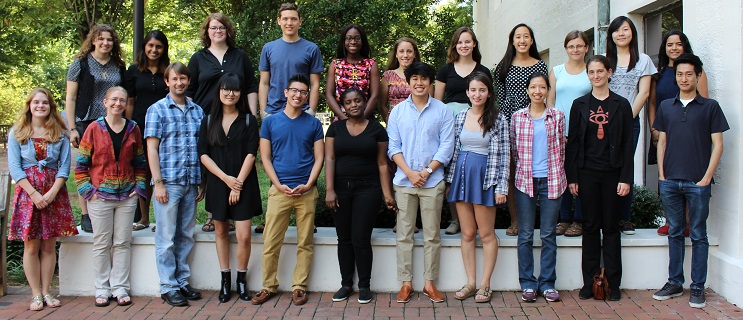Individual Conferences

You are required to meet with me individually at least three times over the course of the semester. Missing conferences will result in deductions to your class participation grade.


You are required to meet with me individually at least three times over the course of the semester. Missing conferences will result in deductions to your class participation grade.

The Assignments pages include descriptions of the major assignments for the semester. In addition, you will have frequent, shorter and generally less formal writing assignments. I’ll describe those assignments to you either in class or via blog posts here on this site.
It is vital that you keep up with these as they are assigned. They help prepare you for class, give you a direction to work, give you practice opportunities for writing, critical reading, and thinking. These assignments are due on the assigned date and will NOT be accepted late (unless we make a prior agreement). If you know you will be absent, you must post your assignment early.

All work is due on the date and at the time specified on the calendar. I may refuse to accept or choose to deduct points for late work, and/or I may choose to provide a grade but no detailed feedback for late work.
If something comes up and you cannot get a major assignment completed on time, please email or speak with me as early as possible to make arrangements. If you come to me in advance, I will do my best to be reasonable and to work with you to come up with a solution that allows you to succeed while remaining fair to the rest of the class and meeting my needs as the instructor of the course. If you email me 10 minutes before an assignment is due, or 3 hours after it’s due, I am much less likely to be able to make such accommodations.

Since we are composing multimodally throughout the course, you are encouraged to bring to class and operate laptops, tablets, and smart phones. The classroom is equipped with desktops that we will use regularly. I encourage you to develop best practices for negotiating among virtual communities and the real time of the classroom. What choices can you make to remain attentive to your peers and me, while at the same time engaging with digital resources?

Email is the best way to contact me if you have questions or concerns. Generally, I will respond to all student email within 24 hours (although on weekends and holidays, it may take a little longer). Likewise, there may be instances when I will need to contact you by email. It is your responsibility to check your Emory-based email account at least once every 24 hours.

Please consider all writing for this class to be “public.” Part of becoming an effective writer is learning to appreciate the ideas and feedback of others. In this course, our purpose is to come together as a writing community. Avoid writing about topics that you wish to keep private or that you feel so strongly about that you are unwilling to listen to the perspectives of others.

Tutors in the Emory Writing Center and the ESL Program are available to support Emory College students as they work on any type of writing assignment, at any stage of the composing process. Tutors can assist with a range of projects, from traditional papers and presentations to websites and other multimedia projects. Writing Center and ESL tutors take a similar approach as they work with students on concerns including idea development, structure, use of sources, grammar, and word choice. They do not proofread for students. Instead, they discuss strategies and resources students can use as they write, revise, and edit their own work.
Students who are currently enrolled in an ESL-supported section of English 101, English 123, or English 221 or who plan to take one of those courses next semester should see ESL tutors, as they are specifically trained to support students in ESL Program courses. Go here to learn more about ESL tutoring or to make an appointment.
All other students in the college should see Writing Center tutors who are trained to work with this broader population. Go here to learn more and make an appointment at the Emory Writing Center. Please review tutoring policies before your visit.

If English is not your first language and if you need additional help with assignments in this or other college classes, you may benefit from working with specially trained ESL Tutors. The tutors are undergraduates who will support the development of your English language skills. Like Writing Center tutors, ESL tutors will not proofread your work. Language is best learned through interactive dialogue, so when you come to an ESL tutoring session, be ready to collaborate! ESL tutors will meet with you in the ESL Lab in Callaway S108 and other designated locations, and they will help you at any stage of the process of developing your essay or presentation. You may bring your work on a laptop or on paper. If you schedule an appointment in the ESL Lab, you may also bring your work on a USB stick — computers are available in the lab.
Visit the website of the Office for Undergraduate Education and select “Student Support” and then “ESL Program” to schedule an appointment, read the tutoring policies, and view the offerings of the ESL Program. If you do not have a scheduled appointment, you may want to meet with a drop-in tutor in the ESL Lab, Callaway S108. Here, you may have less time with a tutor if other students are waiting, but you can briefly discuss an assignment and some of your concerns. For more information, visit the website or contact Levin Arnsperger at larnspe@emory.edu.

I strive to create an inclusive learning environment for all. I am invested in your success in this class and at Emory, so please let me know if anything is standing in the way of your doing your best work. This discussion can include your own learning strengths, any classroom dynamics that you find uncomfortable, ESL issues, disability or chronic illness, and/or personal issues that impact your work. I will hold such conversations in strict confidence.
This course emphasizes user-centered design and the value of connectivity over static standards to facilitate “universal instructional design.” Issues of accessibility are an integral component of instruction for all students. While students should disclose non-standard needs in keeping with guidelines provided by the Office of Disability Services in order to have those needs augmented by digital tools such as voice to text software or close captioning, the course recognizes the extent to which all students are “multiply situated learners.” ((Price, Margaret. Mad at School: Rhetorics of Mental Disability and Academic Life. Ann Arbor: University of Michigan Press, 2011. Print. 88)) As such, the course emphasizes shared strengths over remediation.
All of that said, Emory University complies with the regulations of the Americans with Disabilities Act of 1990 and offers accommodations to students with disabilities. If you are in need of a classroom accommodation, please make an appointment with me to discuss your situation as soon as possible.
For more information, please visit Access, Disability Services and Resources or contact the office by phone at (404) 727-9877 [voice] or TDD: (404) 712-2049. Students who receive accommodations must present the Accommodation Letter from ADSR to your professor at the beginning of the semester, or when the letter is received.

The Office for Undergraduate Education offers programs to support student learning. These include mentoring, coaching, and tutoring services for individuals and small groups. In addition, special support is available for students with special needs and those for whom English is an additional language.